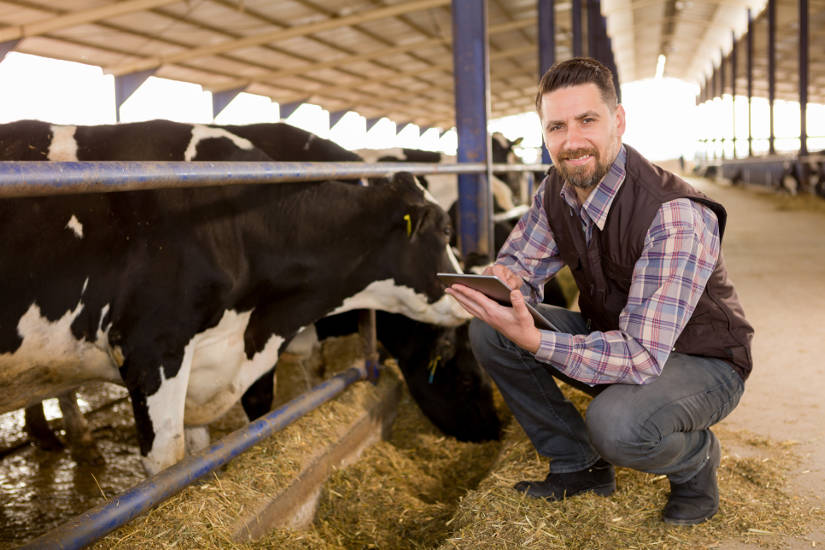Increasing numbers of farmers see technology as useful and important to their farming businesses, and farmers are looking to invest further in new technology over the coming years. Despite this, lingering concerns about data sharing, privacy and control remain.
According to the October 2016 Commonwealth Bank of Australia Agri-Insights Survey of 1600 Australian farmers, 70% of farmers believe that the digital technology available adds significant value to their businesses.
The Ag Data Survey published by the American Farm Bureau Federation (AFBF) also found that farmers are optimistic about technology, with 77% of farmers planning to invest in new technology for their farms in the next three years.
Farmers also see value in sharing and re-use of data, but privacy and control are the largest barriers to more widespread re-use.
The Agri-Insights Survey found that:
- 76% of farmers think that there is value in sharing on-farm production information with others;
- 58% of farmers currently share some on-farm production information with others; and
- Of farmers who don’t see value in data sharing, “privacy concerns” at 28% is the largest reason.
The New Zealand Office of the Privacy Commissioner surveyed New Zealanders about privacy and their attitudes to data sharing in April 2016. They noted that:
- 57% of respondents were open to sharing data if they could choose to opt out;
- 59% were open to sharing if there were strict controls on who could access data and how it was used; and
- 61% were open to sharing if the data was anonymised and they couldn’t be personally identified.
The US AFBF survey also highlighted some of these concerns in an agricultural context:
- Only 33% of farmers had signed contracts with their ag-tech provider. Another 39% knew of their provider’s policies but had not signed anything;
- When farmers were asked if they were aware of the ways in which an ag-tech provider might use their data, 78% of farmers answered “no”; and
- 77% of farmers were concerned about which entities can access their farm data and whether it could be used for regulatory purposes.
Not just farmers
Confidentiality and control can be barriers to companies too. After all, much of the data is about their activities, products, or equipment as well as the farm itself.
It’s not always clear how other parties will behave when sharing data. Organisations generally make reasonable and effective use of data and meet confidentiality expectations, but there is always a risk that they won’t. So companies sharing data are forced to negotiate “iron-clad” agreements, keeping the corporate lawyers busy and making any new data exchange the subject of long-winded negotiations.
As soon as you get into negotiations like this, costs rise. If one of the parties is a smaller player with less negotiating power (company or farmer), they may never be able to conclude a useful data access deal. The end result? A slower rate of innovation, the benefits of information to the farmer and overall supply chain are not fully realised, and sharing data becomes a much more expensive exercise than you would otherwise expect.
Over the years, industry players have experimented with different ways to address these issues. Centralised industry-good databases and exchanges have been proposed, and these could be very effective. Unfortunately, concern about centralising large amounts of data, and the loss of control that this brings has led players to hold back some or all of their data from such repositories.
Other groups have posited that all data should be in the exclusive control of the farmer, and have built exchanges or created open API standards on that basis. We applaud this, but it doesn’t always reflect the significant effort that companies and service providers invest in creating and curating some data sets. The end result is that some data sets are often held back from such exchanges.
A collaborative approach
The New Zealand primary industry has worked on several approaches to this problem in a collaboration between the red meat sector, the dairy sector, and the Ministry for Primary industries.
The Farm Data Code of Practice is designed to encourage greater transparency between farmers and service providers or vendors about the data that is held, and the rights that each party has to the data. A straight-forward accreditation process gives farmers confidence that organisations have “got their house in order” when it comes to terms and conditions and data policies.
The DataLinker protocol builds on the standardised, open API approach to sharing data, but with three key considerations:
- It provides a way for organisations to agree a Data Access Agreement without a protracted legal negotiation. Standard agreements are provided and encouraged, to reduce the overhead that all parties face in legal costs and time (that said, custom agreements are still possible where absolutely necessary).
- Accepting a Data Access Agreement doesn’t give the recipient “open slather” to the data; for most data sets, explicit farmer approval is also required, requested and confirmed by the farmer using standard web authorisation protocols. Farmers grant permission to access data that covers their business, and can also withdraw that authorisation.
- As an Open API approach is used rather than a central database or exchange, there is no “central service” that must be involved in each data transfer. This reduces the “attack surface” from a security perspective and enables organisations to retain control of the data they hold.
Organisations adopting the DataLinker protocols benefit in several ways:
- Farmers see that they are playing their part in maximising the use of information;
- Standardised APIs and Data Access Agreements reduce the time and money invested in negotiating and creating custom solutions for every interaction;
- Data Access Agreements mean that companies still retain the necessary control over high-value data sets, and are able to meet the privacy and confidentiality terms they have agreed with farmers; and
- Companies and farmers can efficiently use sets of data which otherwise might have been too expensive to collect, or required a level of farmer input which would have discouraged adoption.
Our hope is that this framework will help organisations and farmers to maximise use of farm information, reducing long-term costs and encouraging greater innovation.
What you can do about this:
- Want to see which New Zealand companies are accredited under the Farm Data Code of Practice? Check out www.farmdatacode.org.nz and drop an email to your key information providers to find out when they will be accredited.
- Interested in the DataLinker protocols and how they can be adopted by your business? You’ll find information at www.datalinker.org.
- Planning your strategy in this data space, or considering next steps? Talk to us – we’re happy to provide you with background and advice.

